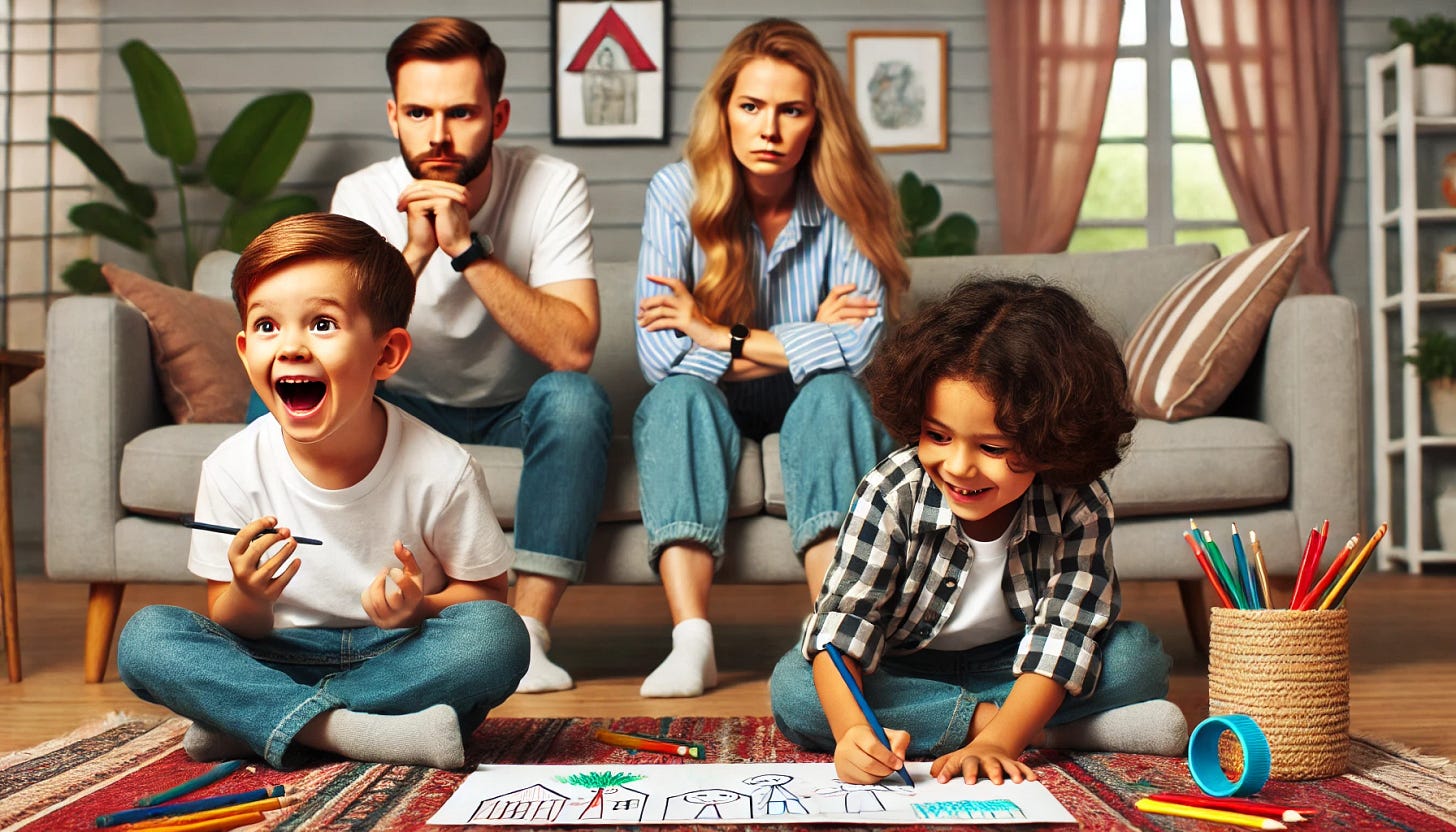The Astonishing Secret: Why Parents Are Jealous of Their Own Kids
A freestyle post with no prepared outline or prior thought, straight from the heart, I hope you enjoy.
I’ll start this one off by saying that I was planning on working on a completely different writing project today but something, actually I should say, someone completely changed my trajectory this morning. That someone is Tom Kuegler ⛺🪵🔥
I saw one of his notes this morning during my morning routine on Substack and part of the note describing what motivates us to write really spoke to me:
Money is a classic motivation. Views is another. If your motivation is views, then you’ll burn out pretty quickly. But what if your motivation was to just have something to look back on? It would be like journaling. And it would be
A. Loads more enjoyable, and
B. Much more sustainable
Now we’re talking. Motivation is important. Second, keep writing fun. Writing shouldn’t be a chore. It’s therapy.
Shortly after reading this, an idea for a topic came blasting into my mind and I felt a huge jolt of excitement to create it today. So that’s what I’m doing. Thanks again Tom!
First off..
I’d like to start by saying that I have firsthand experience with this topic, although there was a time as a young kid when this would have seemed like an impossible scenario to be in.
Growing up, my parents were very excited about their kids. I remember always running to the door to give them a hug when they came home from work.
I knew that this really made their day, and it made mine too. My parents both worked full-time growing up, so my younger brother and I had various babysitters over the years.
I remember the first 10 years or so being a fun time in our household where my parents supported what we wanted to do as kids, whether it was sports, piano lessons, boy scouts, etc.
We tried a lot of different things growing up, and my parents rarely said no to new experiences.
At the age of 10, I remember asking my parents when I would be able to have a cup of coffee like they did every morning. It seemed like such a cool part of their morning, and I wanted to join them in it.
I remember my mom saying, “You can have your first cup when you are 12.” As a curious kid, I wondered why 12. So I asked her. “Because that’s when I was able to have it,” she replied.
At that age, I didn’t really think anything of it, but getting older as an adult prompted me to revisit that interaction and see what was really going on there.
First, I’d like to say that as a critical thinker, given what I now know about coffee, if I had children today and they asked me the same question, I would say around the age of 16.
I personally think 12 is too early to start introducing caffeine into the system, although at 12, I happily poured my first cup of coffee.
I’m curious what you, as the reader, think is an appropriate age. Let me know!
Fast forward through my teenage years, I remember hearing my mom saying things like, “I didn’t have that at your age,” or “I wasn’t allowed to do that as a child, so you can’t either.”
My father did not have a strong sense of jealousy or envy towards us growing up, but when we became adults, there were a few things that I noticed that changed in him.
My parents divorced when my brother and I were teenagers, so after that point, if my brother or I were ever in a relationship and my parents were single, it definitely had an impact on them because we had something that they wanted.
The energy they expressed towards us during that time was different; you could feel the chill in the air.
I can say that some of the treatment or ways they interacted with our partners were unacceptable in many ways. It was uninviting, cold, and very noticeable, even if they thought they were hiding it well.
Since my parents divorced 20 years ago, they have both had various partners, all of whom my brother and I greatly respected, even if they were not our cup of tea.
I can’t help but think had we treated them even a fraction of the same way they had treated ours, they would have had a huge problem with it and many things to say afterward.
As young kids, I remember my mom getting angry a handful of times when my brother and I were either loud or acting out in public.
She used to say that we were embarrassing her. But I see kids screaming at the airport all the time, and parents are very calm.
Also, the people around understand the situation. They’re kids; they can’t completely be controlled, and if they do act out, it’s not necessarily a sign of bad parenting, but just kids being kids trying to figure it all out.
Fast forward again to adulthood, my brother and I both own our own 7 and 8-figure companies, with my brother’s monetary success greatly exceeding that of our whole family.
The interesting thing was seeing my parents’ reactions when they realized his monetary success or when they first walked into the mansion that he bought for his family.
They were almost silent, with very few compliments, if any, and were always focused on the “what if everything comes crashing down” thought.
I remember feeling really bad after finding out about this, that they had not been able to give my brother the recognition and compliments that he so rightfully deserved.
My brother worked hard for his success; it’s not like he won the lottery. Had he not made the moves he made and risked it all, he would not be where he is today.
I admit, I was also envious of him for the first year, simply because he was younger than me and had 10x more than I had.
My success wasn’t as focused on because it was more in line with what my parents had achieved, but I do remember my mom visiting my fiancée and I after we just purchased a new home, and she said, “Both of my sons now have nicer homes than I do.”
The question is, does it really matter?
Let’s dive into the meat of this post.
What’s going on here exactly? Aren’t parents supposed to support their kids in this way and want them to be successful?
Wouldn’t a parent naturally want their kids to succeed them in their lifetime?
Isn’t that a sign of good parenting, and a triumph for them?
After studying human behavior and relationships for well over 15 years, I believe the answers to the above questions are all yes.
I even think that my parents would agree if I asked them those very questions.
So what’s missing here?
If we take a deep dive into the human life cycle, we realize that our parents were once children, and their upbringing and conditioning have had an enormous effect on the type of people they have become, whether they realize it or not.
"You can ignore reality, but you cannot ignore the consequences of ignoring reality." — Ayn Rand
I do believe that all parents want what’s best for their children.
I also believe that all people are inherently good at heart, and it is the trauma and misunderstandings along the way that lead people to attach to their darker sides to cope with what they are missing.
And that is exactly the next point that we’re going to get into.
After looking at this more closely, I believe that parents act this way during certain aspects of their children’s lives because it brings up an insecurity or traumatic experience that they once endured and have still not yet addressed.
When I was jealous of my brother’s success, one day I sat down and asked the question, “Why do I feel this way?”
At one point, the feeling was so strong that I never thought it was going to go away and that it would torment me for the remainder of my existence.
But you know what?
The feeling goes away once it is correctly addressed. How about that! Having the courage to look into why you feel the way you do is one of the most powerful aspects of being human.
So why did I feel that way towards my brother’s success?
Some quiet thinking and reflecting revealed that it was simply because I wanted the same thing for myself, and also that I wasn’t really doing what I wanted in life. Sure, I love the company I’ve built, but it’s become a bit stale, as things often do.
The universe has a funny way of moving you forward, and if you’re not excited about what you’re doing, it will show up in different ways in your life.
It’s the universe’s way of nudging you to the next step.
Our job here on Earth is never done.
In fact, retirement is a great goal to move towards, but it’s important to retire and still have a sense of purpose.
Too many times we see people retiring or afraid to retire because they don’t know what to do with their time. Hence, a strong purpose is essential all the way to your last day on Earth.
Real quick, that does not mean you need to work for your whole life.
A friend of mine’s father was a lawyer for over 40 years, and after he retired, he knew about the things I’m describing above.
Since he did not have to go to work for 12 hours a day, he replaced his purpose with gardening. He spends most of his time outside now and has a beautiful property with rows and rows of luscious, colorful flowers.
Circling back to my story, I realized that I was in control of my own feelings and how I chose to understand them.
I came to the conclusion that jealousy and envy are resolved when you accept the past for what it is and choose to live a happy life on your terms.
Sure enough, as soon as I got in touch with my own goals and started to enjoy my days more, I felt an uprising sensation of happiness and fulfillment.
Now, when my brother and others share their successes with me, I can say that I am able to truly hold space for those moments and feel a genuine sense of happiness for them.
Returning to the story about my parents with this new knowledge in hand, I realized that the reason why they felt the way they did was either through:
Defining their worth by materialistic things or their professions
A moment from their past or childhood that left unresolved emotions or trauma
Some other event that occurred which left an empty feeling within them that was never observed, worked through, and filled.
Parents who refuse to admit or acknowledge that there are any unresolved issues in their lives will continue to feel these emotions over and over again as the situation will keep showing up in different forms.
All is designed as a lesson to try to nudge them to see there is a light at the end of the tunnel.
They can indeed feel truly happy and joyous for their successful children in whatever area they may excel in.
This is all because they have found a way to be content with themselves and their past experiences on the inside.
This is not something that is acquired after reading a few self-help books, but rather through specific practices.
The Takeaway
The key takeaway here is that we all have past events that have left us scarred in some way, some of which we may have worked through and others we have not.
In fact, the universe will show us which of those are the most important to resolve if we only take a moment and connect with ourselves to ask the question: “Why am I feeling this way?”
We can then let our innermost self tell us the truth behind our emotions, and once we have that framework, we can work to resolve the way that we feel.
Any substances or crutches that we were using formerly to cope and get through the day become less needed or not needed at all after this type of work is complete.
Imagine being able to return to your existence, feeling reborn and free of past emotional situations that were most likely not your responsibility to begin with.
I can tell you that it is possible because, after working on it myself, I have seen the light at the end of the tunnel.
It’s part of the reason why I wrote this post. I want to share my discoveries with you in case you are struggling in the same boat. There is a way out.
If you enjoyed this post, be sure to leave a comment. If you’d like to see some more writing on dealing with and managing trauma and emotions, just let me know, and I’ll be happy to provide more info on this topic.
Special thanks to Nur Nadar for recommending the book: Adult Children Of Emotionally Immature Parents. I am currently halfway through and what a fantastic read! Can’t wait to discuss more after finishing and processing.
Thanks so much for reading, I wish you a wonderful day!









Glad you’re loving the book, Nick!